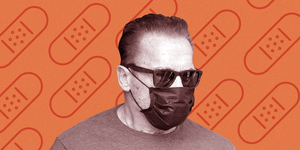So you’ve heard that there might be some vaccination side effects, and you have some tough workouts—and a COVID-19 vaccination shot—coming up this week. Will getting the vaccine make it harder to work out? The health tracker maker Whoop just took an interesting look at their members’ data and it might help you know what to expect.
On January 26, Whoop released a blog post to its members regarding COVID-19 vaccines’ impact on their biometric data. After sampling 1,200 members who self-reported receiving a vaccine over a four-day period in January, the company had crunched the numbers and found double-digit change in elevated resting heart rate and depressed heart rate variability for a significant number of its users. The sample size was small and the survey far from a controlled scientific study, but its conclusion suggests that even among the most conditioned athletes, the COVID-19 vaccine may induce short-term changes affecting performance and recovery ability.

Whoop, which monitors heart rate via a wrist-mounted device and dices it up into usable performance metrics via an app, has been surveying its members about COVID-19 symptoms since March 2020 (it even found an association between changes in users’ respiratory rates and the likelihood they would test positive for COVID-19). Its users already agree in its terms of service for the anonymized use of their data, which Whoop often packages into its recommendations for performance and recovery.
In January 2021, as vaccine distribution rolled out around the U.S., more and more of its members began to report unusual data numbers immediately following inoculation. This flood of screen grabs through its social channels prompted the company to open a special vaccination question on its year-old app tool for a few days. On those days, users reported the date on which they were vaccinated, and Whoop then examined their biometric data for several days around that.
What happened to heart rates and HRV
While most members showed zero effect as the result of the vaccine, 21.6% of members recorded resting heart rates 10 percent or greater than their 14-day baseline, and 28.9 percent showed depressed heart rate variability (HRV) at least 20% below their 14-day baseline. (HRV can depend on a lot of things, but a higher HRV generally means your body is better able to absorb a workout.)
These numbers, on their face, seem noteworthy when approaching your own vaccination date. But there are a number of asterisks. The first is that all vaccinations were self-reported, which can carry timeline errors, and the survey didn’t take into account the individual user’s workouts in that period of time, which could also skew metrics. After all, a hard night’s drinking in celebration after receiving the vaccine or a hilly 20-miler could both skew data. Further, the company has not further broken down data by age, gender, or vaccine type. (And it’s not an official medical study; it’s a look at some interesting biometric data.) Still, Emily Capodilupo, vice president of data science and research at Whoop, says that this response among some members is actually a good thing: “It’s a sign the vaccine’s working. It wouldn’t create antibodies if it didn’t trigger a response.”
“We know there are a lot of reports that the COVID vaccine has more side effects than a typical annual flu shot,” says Capodilupo. “We wanted to approach it not from ‘are vaccines good or bad,’ but, ‘If you’re going to get vaccinated, what should you expect in your data?’”
While a significant change, the effects of the COVID-19 vaccine seem to also be short-lived, lasting for 24 hours following before returning to normal. “That’s one of the things that we wanted to make sure people understood,” Capodilupo says, “so it’s not this freak-out moment.”
“The vaccine stimulates the immune system, and you get an inflammatory response,” explains Dr. William Schaffner, professor of infectious diseases at Vanderbilt University Medical Center and medical director of the National Foundation for Infectious Diseases. Still, Schaffner admits he was surprised reviewing the conclusions, believing that a trained athlete’s immune system would shirk off an inoculation without issue. More research in a controlled environment would be needed to draw concrete conclusions, he says.
When to work out and how hard
Schaffner’s advice until there’s more research: “Definitely get the vaccine.” But on the day of the injection and on the day after? “Don’t try to run the marathon,” he says.
Whoop’s recommendations are similar, and in its blog, the company recommends two guidelines to athletes preparing to get vaccinated:
Source: Read Full Article


